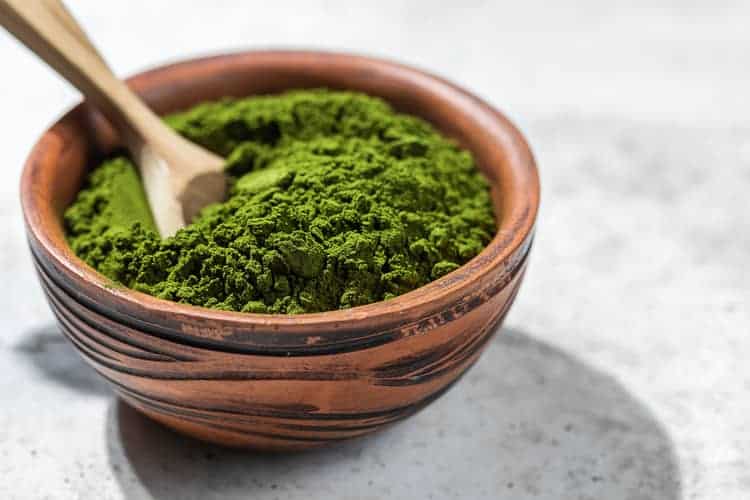
Spirulina – and other blue-green algae – are some of the most popular ingredients in green powders. However, you might be searching for a green powder without spirulina either because you dislike its strong, fish-like flavor or because you’re concerned about its side effects.
Whatever the case may be, this guide is here to simplify your search. We’re going to look at:
- five green powders that are free of spirulina (as well as chlorella and other algae).
- the main things to know about the safety or side effects of spirulina.
BEST GREEN SUPERFOOD POWDERS WITHOUT SPIRULINA
Here are my top picks for green powders that do not contain spirulina.
- Perfect Food Green Superfood – TOP CHOICE
- Moringa Leaf Powder
- Superfood+ Greens Blend
- Amazing Trio
- Organic Adaptogens Powder
1. Perfect Food Green Superfood from Garden of Life – TOP CHOICE
This powder comes with everything that green superfood blends are known for, such as:
- probiotics and enzymes to support the gut and digestive system.
- a variety of fruits, veggies and herbs including beets, apples, strawberries, tomatoes and parsley.
- sprouted seeds and grains such as pumpkin seed, sunflower seed, quinoa and amaranth. The fact that they are sprouted increases bioavailability of nutrients while also placing less stress on the digestive system.
- a grass blend that includes, wheatgrass, oat grass, alfalfa grass and barley grass. All of these are in the form of the grass juice powder, which is considered a better option because the grass is juiced (which removes the fiber) and then dehydrated to a concentrated powder.
Available in three flavors (pineapple, apple and chocolate), this powder is a very convenient way of consuming more healthy foods without a whole lot of fuss.
2. Moringa Leaf Powder from FGO
Although this isn’t a green powder blend, it might be one of the best ways to avoid spirulina while still enjoying a very diverse quantity of nutrients (which is what spirulina is known for!).
This is because moringa has a reputation for being the most nutrient-dense, non-aquatic plant (while spirulina is considered the most nutrient dense food, be it aquatic or non-aquatic).
So, even though it doesn’t have the exact same nutritional profile as spirulina, moringa packs in a lot of nutrients.
For example, moringa leaf is:
- very high in protein (approximately 30% of its weight comes from amino acids). In practical terms, this is equivalent to approximately 29.4 grams of protein for every 100 grams of dry weight.
- a rich source of minerals like magnesium, calcium, zinc, iron and phosphorus.
- packed with beta-carotene (higher than carrots or even, pumpkin), which the body converts to vitamin A. However, it’s not clear how much beta-carotene is retained in the production of beta carotene.
- a very good source of vitamin C. In fact, it surpasses oranges.
- rich in antioxidants including flavonoids, carotenoids (including the aforementioned beta-carotene), polyphenols and tocopherols (natural forms of vitamin E).
Overall, moringa is anti-inflammatory, antimicrobial, antibiabetic, antioxidant and protects heart health (source).
3. Superfood+ Greens Blend from Navitas
This is an uncomplicated yet noteworthy blend of three greens: kale, wheatgrass and moringa powder (in that order).
As noted above, moringa is incredibly nutritionally diverse and just might be one of the best alternatives to spirulina.
Also noteworthy for this powder is the fact that the wheatgrass is in the form of wheatgrass juice powder. The juice powder doesn’t have the undigestible fiber that is standard wheatgrass powder. As such it’s easier to absorb.
Overall, a simple and well thought out blend.
4. Amazing Trio from Amazing Grass
This no-fuss blend combines barley grass, wheat grass and alfalfa.
These are all stellar ingredients from a health perspective, but keep in mind that the grass powders are whole grass powder (not grass juice powder).
So, the health of your gut and digestive system will determine just how much of this you actually absorb.
Having said that, there are no absolute rules about whether you should use whole grass powder or grass juice powder. It’s ultimately down to your personal preference!
5. Organic Adaptogens Powder from Amazing Grass
If stress, cortisol imbalance and overall hormonal imbalance are things that you struggle with, then this green powder is for you.
Made primarily from wheatgrass, this blend also contains four adaptogens: ashwagandha, rhodiola, tulsi (aka holy basil) and chaga mushrooms.
As a whole, adaptogens are plants that help us better adapt to stress. In particular, adaptogens help to regulate cortisol (whether it’s too low or too high) so that the body can respond to stress in a more balanced and efficient manner.
In addition, adaptogens come with other benefits that include lowering inflammation, regulating sleep and supporting immune function (chaga mushrooms are particularly good for this).
IS SPIRULINA POWDER SAFE?
Spirulina is on the FDA’s GRAS (Generally Regarded As Safe) list. However, the FDA only addresses spirulina’s safety when used as a food colorant. There is no mention of its safety when taken as a supplement. However, since the FDA does not regulate supplements, it’s logical that they don’t address the use of spirulina as a supplement.
As for other reliable sources, their opinions on spirulina’s safety is definitely split. For example:
- Mount Sinai states that spirulina seems to be safe, even in high amounts. But they do caution that it can be contaminated with toxins and therefore, it should only be purchased from reliable suppliers (source).
- According to a 2010 paper in the journal, Evidence Based Complementary Alternative Medicine: “Many toxicological studies have proven Spirulina‘s safety.” The paper also points to the fact that spirulina is on the FDA’s GRAS list (source).
- The Consumer Labs website states that even though spirulina is part of the cyanobacteria family – many of which can produce a neurotoxin called BMAA – spirulina supplements are generally safe. They also state that while supplements from cyanobacteria can be contaminated with the liver toxin microcystin, this doesn’t usually happen with spirulina supplements (source).
- As for integrative medicine expert, Dr. Weil, he states that spirulina is not safe, mainly because of the aforementioned toxins (BMAA and microcystin). In addition, he also points out that there isn’t enough research to support the nutritional claims made about spirulina (source).
So, as you can see there are varying opinions about spirulina’s safety.
As is often the case with natural remedies, it’s up to you to research the topic and/or talk to your doctor, in order to form your own opinion.
RELATED QUESTIONS ABOUT GREEN POWDERS THAT DON’T HAVE SPIRULINA
What is spirulina good for?
Spirulina is a cyanobacterium that is said to have been used as a food as far back as the Aztec civilization. Research suggests that spirulina has a wide range of benefits and may help with:
- boosting energy.
- allergies (by inhibiting the release of histamines).
- supporting immune function.
- lowering inflammation.
- regulating cholesterol.
- combating the effects of oxidative damage.
CONCLUSION
Finding a green powder that doesn’t contain spirulina is no easy feat!
I hope the supplements presented in this article are the right fit for you and that they help make your health journey more enjoyable.
Related Posts:
6 Best Green Powders for Bloating
Green Powder vs Red Powder: Are They Worth It | Which Is Best
11 Green Powders Without Stevia (or Processed Sweeteners) That You Should Know About







